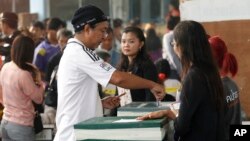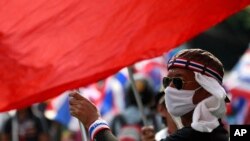BANGKOK —
Voter turnout in Thailand's February 2 election was dampened by a boycott by the main opposition party as well as anti-government protesters who tried to block voting. But as ballot counting continues, analysts say the lower turn-out also appears to show the ruling Pheu Thai party lost some support.
Out of 43 million eligible voters in Thailand, 20 million, about 47 percent, cast their ballots, according to unofficial results.
That compares to a 75 percent voter turnout in 2011, the last election in Thailand's ongoing political turmoil.
Thai authorities say an opposition boycott and anti-government protesters were largely to blame for the lower numbers.
Occupying major Bangkok intersections for months, the protesters campaigned against elections, prevented some candidates from registering to run, and blocked polling officials, ballot delivery and voters in parts of the country.
Thailand Development Research Institute's Somchai Jitsuchon estimates about half of those who did not vote were opposition Democrat Party supporters. But, he says there are many reasons why people did not cast a ballot.
"There are ones who are fed up with this government. There are one who are fed up with the whole system. And, there are ones who probably would like to vote for the Pheu Thai but were prevented from doing that. And, also there may be those who believe that this election will be invalid, finally. So, they didn't think that they should go out to vote anyway because it would not be counted," said Somchai.
Thailand's Election Commission says an estimated three million Thais voted for none of the candidates, known as a "no vote."
Somchai says that although the turnout figures must be interpreted carefully, preliminary indications show the embattled Pheu Thai party also lost significant electoral support.
"But from some of the estimates, most people believe that the Pheu Thai party will get less vote this time around than what they got in the previous election, probably by a few million less. So, that would affect into their legitimacy in terms of forming the government," said Somchai.
Somchai notes any new government's legitimacy will also be affected by the absence of the opposition Democrat Party.
The anti-government protests started in November when the ruling Pheu Thai party backed a controversial amnesty bill before it was voted down in the Senate.
The law would have dropped charges against top leaders during years of political unrest, and voided a prison sentence given former Prime Minister Thaksin Shinawatra.
Opposition Democrats denounced the bill, but it was also rejected by the ruling party's mainly rural "Red Shirt" supporters. They said it let off Democrat Party leaders who ordered a military crackdown in 2010 against protesting Red Shirts. More than 90 people died in the fighting.
Noppadon Pattama, one of Thaksin's lawyers and a ruling party lawmaker, acknowledges the amnesty push was a mistake.
"If we can go back, you know, rewind the tape back, we would not have proposed that amendment to the bill. It's a... grave political miscalculation at that particular time because the society may not be ready for that type of law. We haven't done enough PR for the introduction of that particular piece of law at that particular time," said Noppadon.
As ballot counting continues from Sunday’s poll, numerous legal challenges to the vote are being waged in Thailand’s courts. The final results of the election are not expected for months.
Out of 43 million eligible voters in Thailand, 20 million, about 47 percent, cast their ballots, according to unofficial results.
That compares to a 75 percent voter turnout in 2011, the last election in Thailand's ongoing political turmoil.
Thai authorities say an opposition boycott and anti-government protesters were largely to blame for the lower numbers.
Occupying major Bangkok intersections for months, the protesters campaigned against elections, prevented some candidates from registering to run, and blocked polling officials, ballot delivery and voters in parts of the country.
Thailand Development Research Institute's Somchai Jitsuchon estimates about half of those who did not vote were opposition Democrat Party supporters. But, he says there are many reasons why people did not cast a ballot.
"There are ones who are fed up with this government. There are one who are fed up with the whole system. And, there are ones who probably would like to vote for the Pheu Thai but were prevented from doing that. And, also there may be those who believe that this election will be invalid, finally. So, they didn't think that they should go out to vote anyway because it would not be counted," said Somchai.
Thailand's Election Commission says an estimated three million Thais voted for none of the candidates, known as a "no vote."
Somchai says that although the turnout figures must be interpreted carefully, preliminary indications show the embattled Pheu Thai party also lost significant electoral support.
"But from some of the estimates, most people believe that the Pheu Thai party will get less vote this time around than what they got in the previous election, probably by a few million less. So, that would affect into their legitimacy in terms of forming the government," said Somchai.
Somchai notes any new government's legitimacy will also be affected by the absence of the opposition Democrat Party.
The anti-government protests started in November when the ruling Pheu Thai party backed a controversial amnesty bill before it was voted down in the Senate.
The law would have dropped charges against top leaders during years of political unrest, and voided a prison sentence given former Prime Minister Thaksin Shinawatra.
Opposition Democrats denounced the bill, but it was also rejected by the ruling party's mainly rural "Red Shirt" supporters. They said it let off Democrat Party leaders who ordered a military crackdown in 2010 against protesting Red Shirts. More than 90 people died in the fighting.
Noppadon Pattama, one of Thaksin's lawyers and a ruling party lawmaker, acknowledges the amnesty push was a mistake.
"If we can go back, you know, rewind the tape back, we would not have proposed that amendment to the bill. It's a... grave political miscalculation at that particular time because the society may not be ready for that type of law. We haven't done enough PR for the introduction of that particular piece of law at that particular time," said Noppadon.
As ballot counting continues from Sunday’s poll, numerous legal challenges to the vote are being waged in Thailand’s courts. The final results of the election are not expected for months.





